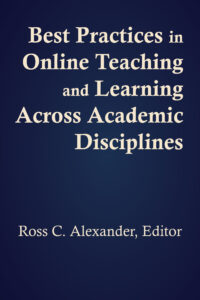Online courses have surged in recent years, making online teaching an inevitable part of higher learning. While convenient for students and faculty, the lack of facetime can be a challenge. Best Practices in Online Teaching and Learning Across Academic Disciplines (George Mason University Press, 2017) explores strategies for online teaching with an emphasis on distinct approaches for different academic disciplines. The book offers innovative, practical and successful teaching tools from Indiana University East faculty in a wide range of disciplines designed to keep students engaged.
 Best Practices covers online teaching and learning with a three-fold approach. Each chapter discusses and analyzes best practices and pedagogical approaches for online teaching. Attention is also given to instructional design and delivery, useful for course designers or academic administrators. Finally, the authors provide applicable and proven techniques that can be integrated into online courses across more than 15 disciplines.
Best Practices covers online teaching and learning with a three-fold approach. Each chapter discusses and analyzes best practices and pedagogical approaches for online teaching. Attention is also given to instructional design and delivery, useful for course designers or academic administrators. Finally, the authors provide applicable and proven techniques that can be integrated into online courses across more than 15 disciplines.
The first and largest section of Best Practices opens with chapters for the Humanities and Social Sciences. Faculty across these disciplines, from English to Psychology, break down innovative and actionable teaching tools you can use for online teaching. Editor Ross C. Alexander notes, “Three chapters in particular—chapters three, seven and nine, dealing with composition, foreign languages, and drawing—may be of particular interest as they showcase disciplines that one may not typically associate with online teaching and learning, but are effectively taught using approaches and techniques described here” (Best Practices in Online Teaching and Learning Across Academic Disciplines, page 5).
The second section focuses on the natural sciences and mathematics. While these disciplines may also not be commonly associated with online instruction, the authors of these two chapters share why laboratory instruction online can be superior to a traditional, face-to-face model.
The third section handles professional programs, including education, economics and finance, and nursing. While online teaching is fairly common at the graduate level, these chapters zero in on these programs at the undergraduate level, which may not see as much online education. Faculty will learn how to support students on their way to becoming teachers, business leaders, or nurses.
With detailed examples, charts and rubrics, Best Practices provides faculty members the tools to design better curriculum and enhance online learning for their students.
Best Practices in Online Teaching and Learning Across Academic Disciplines
Edited by Ross C. Alexander. Paperback. 300 pages. George Mason University Press. $30.
This book can be purchased from Amazon, or from your favorite independent bookseller.
George Mason University Press titles are distributed by the University of Virginia Press.
Table of Contents
Introduction: Ross C. Alexander, Ph.D.
Part One • Humanities and Social sciences
1 Communication Studies: Fostering Effective Communication in Online Courses
Rosalie S. Aldrich, Renee Kaufmann, Natalia Rybas
2 Composition and Writing: Embedding Success: Supplemental Assistance in Online Writing Instruction
Sarah E. Harris, Tanya Perkins, J. Melissa Blankenship
3 English: Facilitating Online Learning through Discussions in the English Classroom: Tools for Success and Stumbling Blocks to Avoid
Margaret Thomas-Evans, Steven Petersheim, Edwina Helton
4 Political Science: Engaging Students through Effective Instruction and Course Design in Political Science
Chera LaForge, Kristoffer Rees, Lilia Alexander, Ross C. Alexander
5 Criminal Justice: Calming, Critical Thinking, and Case Studies: The Politics, Pitfalls, and Practical Solutions for Teaching Criminal Justice in an Online Environment
Stephanie N. Whitehead, M. Michaux Parker
6 Psychology: Student misconceptions of psychology: Steps for helping online students toward a scientific understanding of psychology
Beth A. Trammell, Gregory Dam, Amanda Kraha
7 World Languages (Spanish and French): Best Practices in Online Second Language Teaching: Theoretical Considerations in Course Design and Implementation
Dianne Burke Moneypenny, Julien Simon
8 History: Teaching History Online: Old Struggles, New Pathways
Justin Carroll, Christine Nemcik, Daron Olson
9 Fine Arts (Drawing): Best Practices in Online Teaching for Drawing
Carrie Longley, Kevin Longley
10 Sociology, Anthropology, and Geography: Igniting the Passion: Examples for Sociology, Anthropology, and Geography
Denise Bullock, Katherine Miller Wolf, Wazir Mohamed, Marc Wolf
11 Philosophy: The Proof is in the Pedagogy: A Philosophical Examination of the Practice of Backward Design
Mary A. Cooksey
Part Two • Natural Sciences and Mathematics
12 Biological Sciences: Online Teaching and Learning in Biological Sciences
Parul Khurana, Neil Sabine
13 Mathematics: Best Practices of Online Education in Mathematics
Young Hwan You, Josh Beal
Part Three • Professional Programs
14 Education: Building Online Learning Communities on the Foundation of Teacher Presence
Jamie Buffington-Adams, Denice Honaker, Jerry Wilde
15 Economics and Finance: Using Simulation Games to Engage Students in Online Advanced Finance Courses
Oi Lin Cheung, Litao Zhong
16 Nursing: Meeting QSEN Competencies in the Online Environment
Paula Kerler Baumann, Tonya Breymier, Karen Clark
Author Biographies
